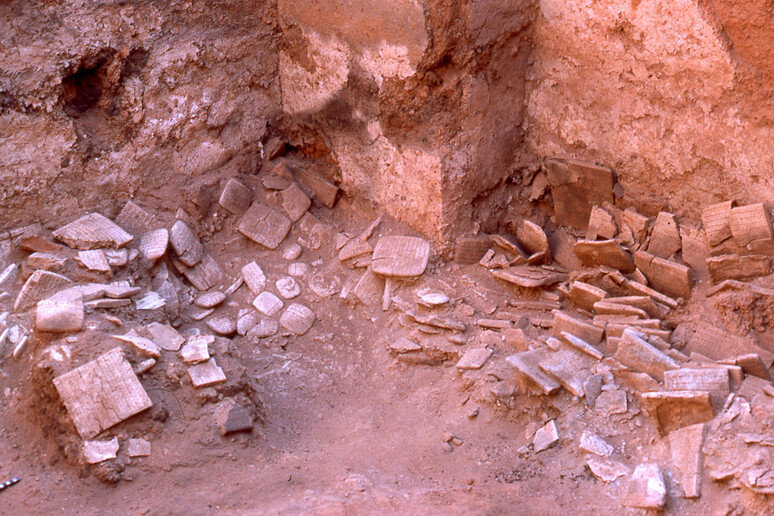By Silvia Lambertucci
Trenches dug among temple ruins,
pillboxes set up inside city walls that are thousands of years
old, perhaps with some unexploded land mines thrown in - the
ancient city of Ebla, discovered by Italian archaeologist Paolo
Matthiae in 1964, endured years of devastation while it was
occupied by al-Qaeda rebel militias.
But, after being liberated by the Damascus government, it will
now be possible to render the Ebla archaeological park safe in
order to resume excavating at what is recognized as a legend of
global archaeology - the most important discovery of the second
half of the 20th century.
The good news was revealed to ANSA by the celebrated
archaeologist himself, the emeritus director of the research
project, who on Saturday evening will receive an award for
Comunicazione dell'Antico (Communication of Ancient Times), a
project organized by the Naxos Park in collaboration with
Naxoslegge.
The archaeologist from Rome's La Sapienza University revealed
that some members of the Italian mission are set to return to
the site at Tell Mardikh, 55 km south of Aleppo, for the first
time since 2010.
They will make the fruit of 47 years of uninterrupted excavation
safe and resume work where it was halted 12 years ago.
"It will take at least three years to set the worksites back up,
along with adequate funding," said Matthiae, who, after working
ceaselessly to keep attention focused on Syria's cultural
heritage as it was damaged by war and terrorism, has made an
appeal to La Sapienza and to the Italian foreign ministry to
guarantee "all the necessary funding allocations".
The devastation in Ebla started in 2014 when al-Qaeda militias
took control of the archaeological park and laid waste to it
with tunnels, trenches and pillboxes that "uprooted the
archaeological terrain, above all in the Lower City of the big
ancient urban center that was build between 2500 and 1600 BC,"
he explained.
It was not until the end of 2019 that the Damascus government
gradually took back control of the area and since then the
officials of the Directorate General of Antiquity and Museums
(DGAM) have got cracking with an exceptional effort to verify
the damage, documenting it and photographing, including with
drones, the large oval that outlines the borders of what was
once one of the most powerful and prosperous city states of the
ancient Near East.
"The good news is that the archaeological park was never
bombed," said the 80-year-old archaeologist.
The devastation, however, is significant and for this reason the
Roman mission is planning what is being defined as the
"rehabilitation" of the archaeological area.
In a few days Frances Pinnock and Davide Nadali, the two La
Sapienza professors who are leading the mission with Matthiae,
will be on site and they will start to study the material
safeguarded at the Hama Museum.
It is a small initial step in the hope that it will then be
possible to organize a bigger team and reopen the worksite,
which in the past had 120 local workers in operation.
Powerful like Sargon the Great's Akkad, feared and respected by
the pharaohs of the Old Kingdom, Syria's Ebla remained buried in
mystery for millennia.
Its discovery was one of those that changes history, especially
from 1975, when excavations brought to light intact the Ebla
tablets, almost all of the royal archive of 2350 BC, the most
ancient period, with 17,000 inventory items on tablets carved
into clay in Cuneiform script, representing a treasure trove of
inestimable value about the city's culture, language, trade,
weddings, justice, and relations with friendly and enemy
peoples.
Originally there were 5,000 texts which, in the years of absence
from Syria, the Italian mission catalogued, studied and
published most of.
They tell the story of a powerful, feared empire that was based
in a key area between Mesopotamia and Egypt.
The city was destroyed and rebuilt three times in the space of
900 years.
The city walls surrounded an area of 50 hectares - a little less
than the Pompeii of many centuries later - of palaces, temples,
tombs and fortifications.
Among other things, the rediscovery of Ebla gave back to Syria a
very ancient historical identity to be proud of.
"It's an archaeological site that potentially still has lots to
offer," stressed Matthiae, pointing out that it is estimated
that only 10% of it has been excavated.
Indeed, in the years that on-site activity was suspended, the
Rome university concentrated on researching and publishing the
huge mass of Cuneiform texts and archaeological material from
it, some of which is precious and extremely rare, such as a club
engraved with the name of a pharaoh, the likes of which was not
found even in the rich tombs of Egypt.
Concern remains, however, about the destiny of many of these
fabulous finds, including thousands of tablets, which are kept
in the museum nearby in Idlib, which is occupied by Turkish
forces.
There has been violent looting there.
"We are certain that at least some of the tablets have been
stolen or destroyed," said Matthiae.
Fortunately all of these treasures had been photographed and
catalogued and the documentation is already in the hands of
Interpol.
With a little luck, some tablets may reappear on the antiquities
market.
"The important thing is that, after many years of silence and
destruction, a new beginning has started for Ebla," said
Matthiae.
ALL RIGHTS RESERVED © Copyright ANSA











